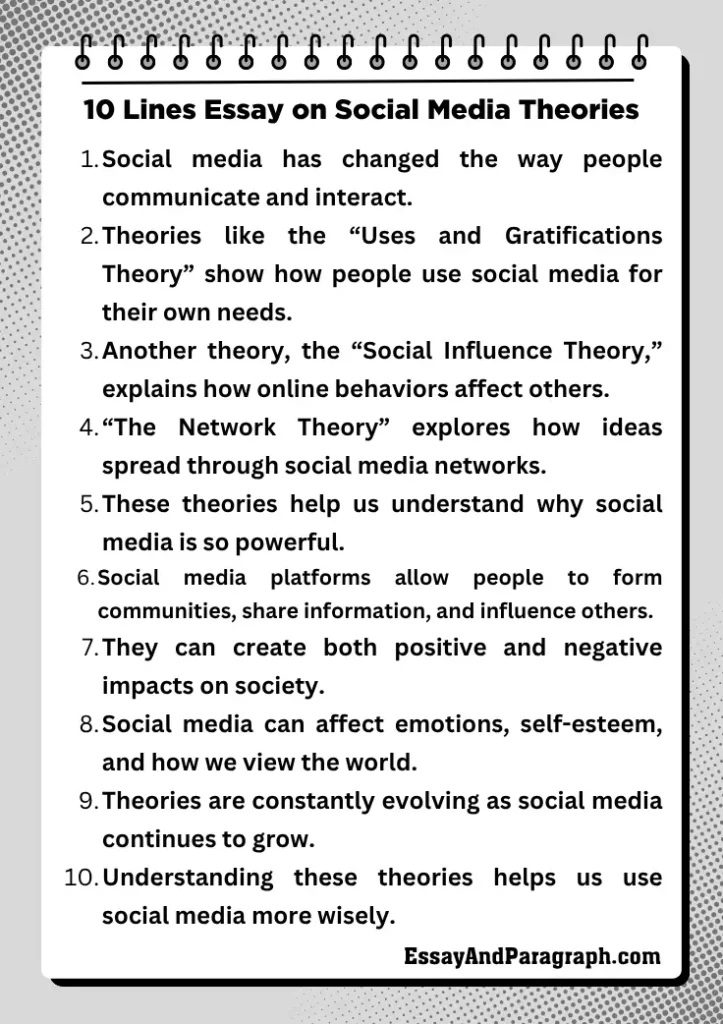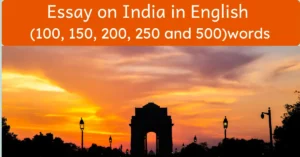Ever wondered how social media affects the way we think, behave, and communicate with each other? It’s more than just scrolling through posts; there are deep theories behind why and how social media influences society. Social media theories explore the impact of online platforms on human behavior, interactions, and culture. These theories help us understand everything from how information spreads to how communities form online. In this article, we will learn how to write an essay on social media theories and explore these fascinating concepts in a way that’s easy to understand.
10 Lines Essay on Social Media Theories
Social media has changed the way people communicate and interact.
Theories like the “Uses and Gratifications Theory” show how people use social media for their own needs.
Another theory, the “Social Influence Theory,” explains how online behaviors affect others.
“The Network Theory” explores how ideas spread through social media networks.
These theories help us understand why social media is so powerful.
Social media platforms allow people to form communities, share information, and influence others.
They can create both positive and negative impacts on society.
Social media can affect emotions, self-esteem, and how we view the world.
Theories are constantly evolving as social media continues to grow.
Understanding these theories helps us use social media more wisely.

100 Words Essay on Social Media Theories
Social media has become an integral part of our daily lives, shaping how we interact and communicate. Theories like the “Uses and Gratifications Theory” explain how individuals use social media to fulfill their personal needs. “Social Influence Theory” explores how behaviors on social media can influence others. Another key theory, “Network Theory,” shows how information spreads quickly across networks, leading to viral content. Understanding these theories helps us grasp why social media is so influential, both positively and negatively, in shaping behaviors and interactions in today’s digital age.
150 Words Essay on Social Media Theories
Social media platforms have revolutionized how we communicate, share ideas, and form connections. Several theories help us understand these changes in behavior. The “Uses and Gratifications Theory” suggests that people use social media to meet specific needs like entertainment, connection, and information. The “Social Influence Theory” highlights how our actions on social media, such as liking or sharing content, can affect the behavior of others. “Network Theory” explains the rapid spread of information, trends, and ideas across social media networks, often leading to viral content. These theories reveal the deep impact social media has on both individual and collective behavior. They offer insight into how these platforms influence everything from daily interactions to global movements. As social media continues to evolve, understanding these theories is essential for navigating its effects on society, ensuring positive outcomes while minimizing negative impacts.
200 Words Essay on Social Media Theories
Social media has transformed the way we communicate, interact, and consume information. Several key theories help us understand the deep impact these platforms have on human behavior and society. The “Uses and Gratifications Theory” suggests that people use social media to fulfill personal needs such as staying connected with loved ones, seeking entertainment, or gathering information. It emphasizes the active role users play in shaping their social media experience.
The “Social Influence Theory” explains how social media behavior can influence others. For example, when we like, share, or comment on a post, it can prompt others to engage similarly. This is why trends and viral content spread so quickly. “Network Theory” looks at how information flows through social media networks, making ideas and content travel fast across different platforms.
These theories reveal the power of social media to shape public opinion, connect people, and influence behavior on both a small and global scale. However, they also highlight the potential dangers of misinformation, cyberbullying, and the spread of harmful content. Understanding these theories helps us use social media responsibly and mindfully, ensuring it remains a force for good in society.
250 Words Essay on Social Media Theories
Social media has drastically altered the way we communicate, interact, and consume information. From simple text posts to complex viral trends, these platforms have become central to modern life. To understand their impact, several theories offer valuable insights. The “Uses and Gratifications Theory” emphasizes that people use social media to fulfill their own needs, such as seeking entertainment, connecting with friends, or staying informed. It highlights the active role that individuals play in selecting content that suits their desires.
Another crucial theory is the “Social Influence Theory,” which explains how individuals’ actions on social media can influence others. When we like or share content, we often prompt others to do the same, which can lead to the rapid spread of ideas, opinions, and trends. This is why social media is so influential in shaping public opinion and creating viral movements.
The “Network Theory” delves into the flow of information across social networks, demonstrating how content can travel far and wide in a short period. This theory helps us understand the speed at which trends and ideas spread on social media platforms.
While these theories highlight the powerful influence of social media, they also show the potential risks, such as the spread of misinformation, negative self-image, and cyberbullying. By understanding these theories, we can use social media more wisely, benefiting from its positive aspects while being aware of its challenges. As social media continues to evolve, these theories will help us navigate its complexities and shape a healthier digital landscape.
500 Words Essay on Social Media Theories
Social media has become one of the most influential forces in the modern world, affecting how we interact, communicate, and consume information. As we scroll through our feeds, engage with content, or share opinions, we may not realize the deep impact that social media has on our behaviors and beliefs. To better understand these effects, several social media theories have been developed. These theories help explain how platforms shape our experiences and interactions online.
One important theory is the “Uses and Gratifications Theory,” which suggests that people use social media to satisfy their personal needs. Whether seeking entertainment, staying connected with friends, or gathering information, individuals are active participants in choosing content that fulfills their desires. This theory emphasizes the idea that users are not passive consumers of social media, but rather, they engage with content that meets specific goals. This theory highlights the diverse ways in which social media serves different purposes for different users.
Another significant theory is the “Social Influence Theory,” which looks at how the actions and behaviors of individuals on social media can influence others. This includes the process of liking, sharing, or commenting on content, which can inspire others to engage similarly. The theory helps explain why certain trends, challenges, or ideas gain momentum so quickly on social media platforms. As people observe others’ behaviors, they may mimic them, leading to the viral spread of content or ideas. This theory illustrates how social media platforms can function as catalysts for change, whether that change is positive, like raising awareness for a cause, or negative, like perpetuating harmful trends.
The “Network Theory” is another important framework that examines how information spreads across social media networks. In these networks, information can travel quickly and widely, making social media a powerful tool for the dissemination of ideas. A single post or tweet can reach millions of users in just a few hours. This theory helps explain the viral nature of content and the formation of online communities around shared interests, beliefs, or causes. Networks on social media are constantly evolving, and this constant flow of information helps shape public opinion, influence behaviors, and create movements.
While these theories provide valuable insight into the positive potential of social media, they also highlight the risks associated with these platforms. Social media has been criticized for its role in spreading misinformation, creating echo chambers, and encouraging unhealthy comparisons. The rapid spread of unverified information can have significant consequences, especially when it comes to political influence or public health. Similarly, social media can sometimes lead to negative self-image or feelings of inadequacy, particularly among young users who are influenced by idealized representations of others’ lives.
In conclusion, social media theories are essential for understanding the impact that these platforms have on our lives. They help us see why social media is so powerful, how it shapes our behaviors, and the potential risks and benefits associated with these platforms. By understanding these theories, we can make more informed decisions about how we use social media and ensure that we are using it in a way that fosters positive outcomes for individuals and society. As social media continues to evolve, these theories will continue to help us understand its role in shaping the modern world and guiding our interactions within it.
FAQs
1. What are social media theories?
Social media theories are frameworks used to understand how social media platforms impact human behavior and society. They explain why people engage with content in certain ways, how trends spread, and how these platforms influence public opinion, emotions, and interactions. Key theories include the “Uses and Gratifications Theory,” “Social Influence Theory,” and “Network Theory.”
2. What is the “Uses and Gratifications Theory”?
The “Uses and Gratifications Theory” suggests that people actively use social media to fulfill specific personal needs, such as entertainment, information, or social connection. Unlike other media consumption, users take an active role in selecting content based on their preferences, making social media an individualized experience.
3. How does the “Social Influence Theory” affect social media behavior?
The “Social Influence Theory” explores how individuals’ behavior on social media can influence others. For example, if a user shares a post or likes a video, others may be influenced to do the same. This ripple effect can help trends go viral and influence people’s attitudes and actions on a large scale.
4. What is “Network Theory” and how does it work on social media?
“Network Theory” examines how information spreads through networks. On social media, a single post can quickly be shared, commented on, and liked, causing it to reach millions of people in just hours. This theory explains why content goes viral and helps form online communities and movements around shared ideas or interests.
5. How does understanding social media theories help us use social media responsibly?
Understanding social media theories allows users to become more aware of how their actions impact others. For instance, recognizing how trends spread can help avoid the spread of misinformation or negative behaviors. These theories also encourage thoughtful engagement and highlight the importance of critical thinking when consuming or sharing content online.
6. Why is it important to study social media theories?
Studying social media theories helps us understand the powerful effects of these platforms on both individuals and society. By understanding the way social media shapes behaviors, emotions, and interactions, we can use these platforms more mindfully, maximizing their benefits while minimizing potential risks, such as misinformation and cyberbullying.

Summary on Social Media Theories
Social media has become an integral part of modern life. From connecting with friends to discovering new trends, these platforms shape how we communicate and interact. Social media theories, like the Uses and Gratifications Theory and Social Learning Theory, help us understand why people use these platforms and how their behavior is influenced by what they see online. These theories show how quickly new ideas spread, how people mimic others, and how the pressure to fit in can lead to silence in the face of differing opinions. As we become more aware of these effects, we can make smarter choices about our social media usage and its impact on our lives.










